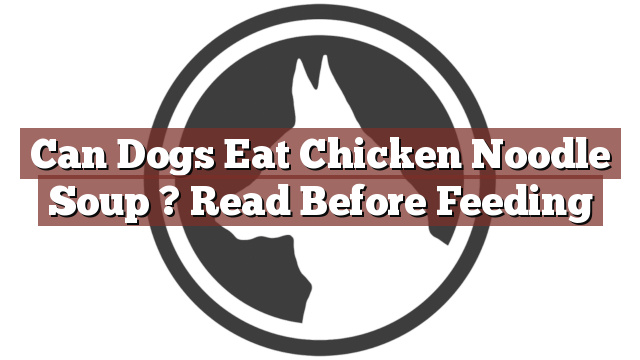Understanding Your Dog’s Dietary Needs
As a responsible dog owner, it is important to understand your furry friend’s dietary needs. Dogs require a balanced diet that consists of the right amount of proteins, carbohydrates, fats, vitamins, and minerals. While some human foods can be safe for dogs to consume, it is crucial to be aware of the potential risks and benefits before incorporating them into their diet.
Can Dogs Eat Chicken Noodle Soup? Read Before Feeding
Can dogs eat chicken noodle soup? This is a common question that many dog owners have. The short answer is yes, dogs can eat chicken noodle soup, but there are several factors to consider before feeding it to your four-legged companion.
Chicken noodle soup can be a tasty treat for your dog, especially during the colder months. However, it is important to ensure that the soup is made from ingredients that are safe for your dog to consume. The soup should not contain any seasonings, such as onion or garlic, as these can be toxic to dogs. Additionally, the noodles should be thoroughly cooked to avoid any digestive issues.
Pros and Cons of Feeding Chicken Noodle Soup to Your Dog
There are both pros and cons to feeding chicken noodle soup to your dog. On the positive side, chicken is a lean protein that can provide essential amino acids for your dog’s muscle health. The broth in the soup can help keep your dog hydrated, especially if they are not drinking enough water. The carrots and other vegetables in the soup can also provide some additional vitamins and minerals.
However, there are a few potential drawbacks to consider. Chicken noodle soup can be high in sodium, which can be harmful to dogs, particularly those with certain health conditions such as kidney disease or heart problems. Additionally, if the soup contains any spices or seasonings, it can cause digestive upset or even toxicity in dogs.
To ensure the health and safety of your dog, it is always best to consult with your veterinarian before introducing chicken noodle soup or any other human food into their diet.
Conclusion: Considerations Before Feeding Chicken Noodle Soup to Your Dog
In conclusion, while dogs can eat chicken noodle soup, it is important to take certain considerations into account before feeding it to your pet. Ensure that the soup is made from safe ingredients, with no spices or seasonings that can be harmful to dogs. Be mindful of the sodium content, especially if your dog has any underlying health conditions. It is always recommended to consult with your veterinarian for personalized advice based on your dog’s specific nutritional needs and health status.
Thank you for taking the time to read through our exploration of [page_title]. As every dog lover knows, our furry friends have unique dietary needs and responses, often varying from one canine to another. This is why it's paramount to approach any changes in their diet with caution and knowledge.
Before introducing any new treats or making alterations to your dog's diet based on our insights, it's crucial to consult with a veterinarian about [page_title]. Their expertise ensures that the choices you make are well-suited to your particular pet's health and well-being.
Even seemingly harmless foods can sometimes lead to allergic reactions or digestive issues, which is why monitoring your dog after introducing any new food item is essential.
The content provided here on [page_title] is crafted with care, thorough research, and a genuine love for dogs. Nevertheless, it serves as a general guideline and should not be considered a substitute for professional veterinary advice.
Always prioritize the expert insights of your veterinarian, and remember that the health and happiness of your furry companion come first.
May your journey with your pet continue to be filled with joy, love, and safe culinary adventures. Happy reading, and even happier snacking for your canine friend!

